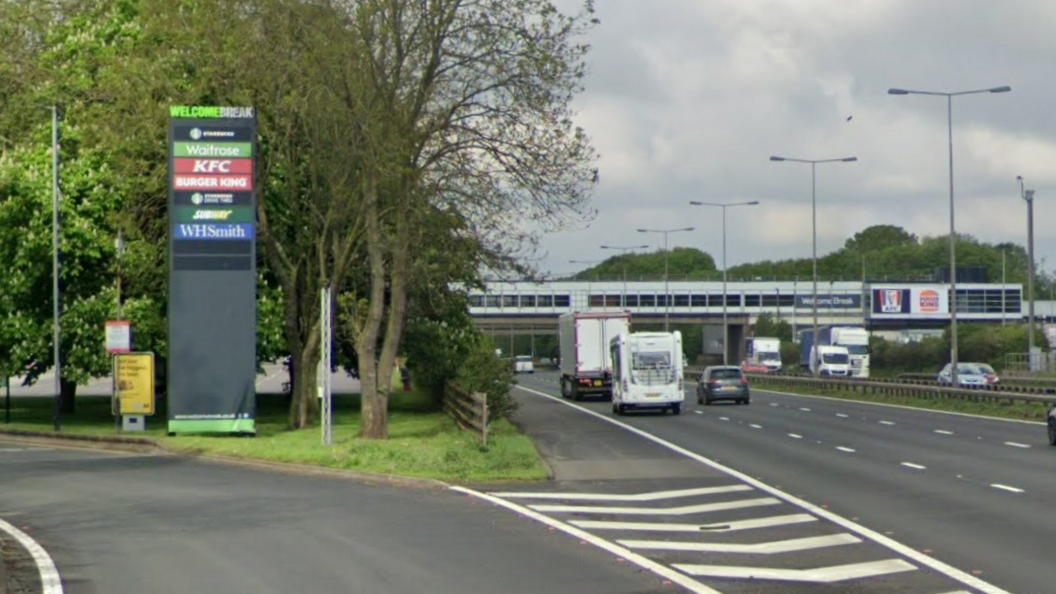Gangs buy haulage firms to steal lorryloads of goods
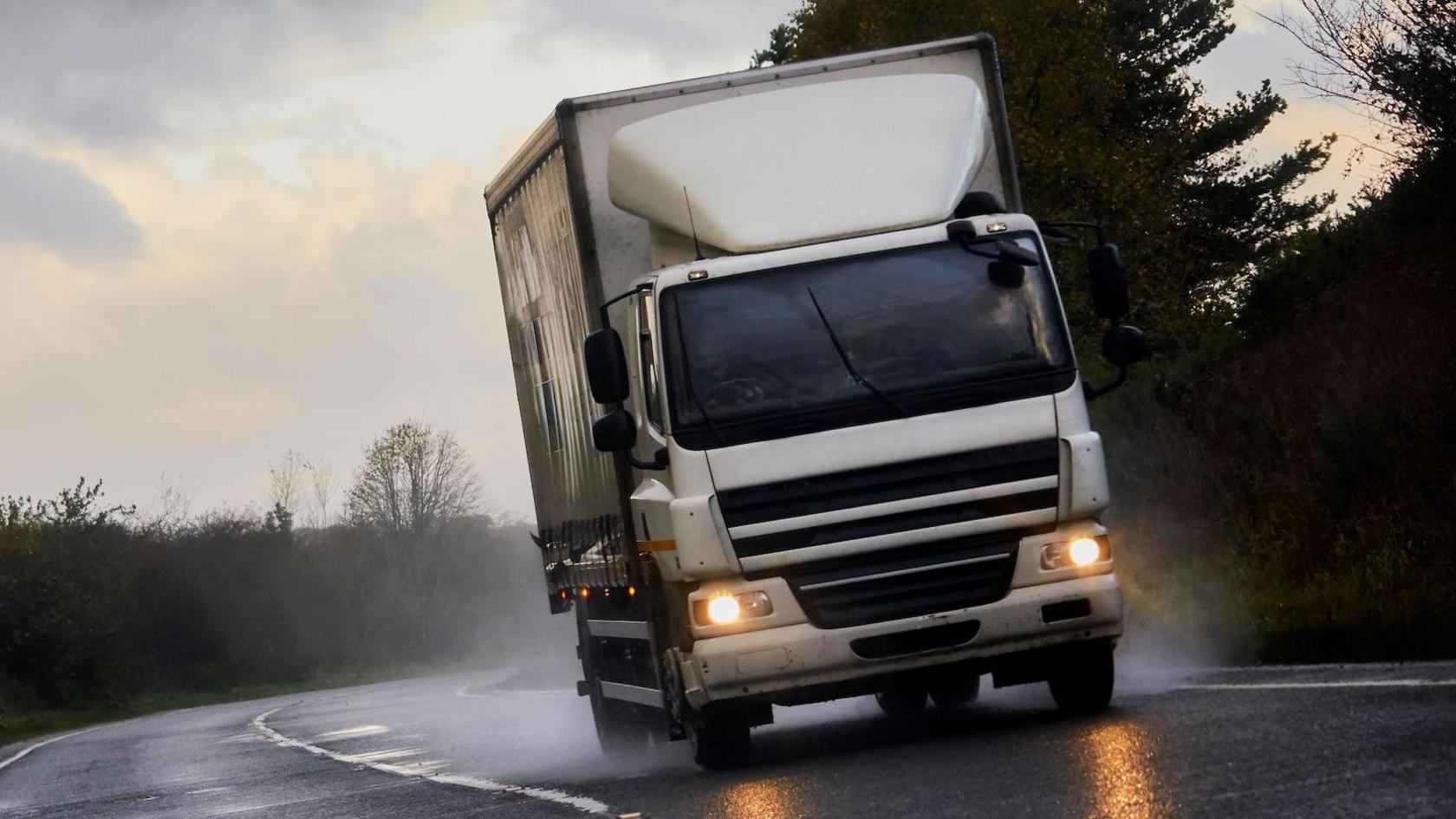
- Published
Criminal gangs are buying up haulage firms to pose as truckers and steal goods by the lorryload, the BBC has learned.
We found evidence that a group of haulage companies were purchased using a dead man's details.
One of the haulage firms was then hired as a subcontractor by an unwitting UK transport company. A manufacturer loaded one of the subcontractor's lorries up with goods - which were then never seen again.
Alison - not her real name - runs the Midlands transport firm that was tricked by the fake subcontractors, and says it is "incredible" that "a gang can go in and target a company so blatantly".
This brazen tactic is just one of the ways criminals are targeting haulage firms who deliver retail stock and other supplies all over the country, as freight theft in the UK rose to £111m last year, from £68m in 2023.
Footage obtained by the BBC shows criminals raiding lorries as they make deliveries, breaking into vehicles while they wait in traffic, cutting locks and breaking into depots, and stealing whole trailers packed with goods.
Watch: Footage of goods being stolen from lorries in broad daylight
Drivers, who frequently have to stop and sleep overnight in their cabs, have told the BBC they often wake to find the curtained sides of their lorries slashed by criminals who tried to get at the cargo inside, with shipments of designer clothes, alcohol and electronics among the most common targets.
"You should care because it hits your wallet," says John Redfern, a former security manager for a major supermarket. As more products get stolen, the cost of goods for the consumer will go up over time, he said.
The National Police Chiefs' Council (NPCC) said freight crime is becoming "more sophisticated, more organised" and said police forces need to work with the industry to respond.
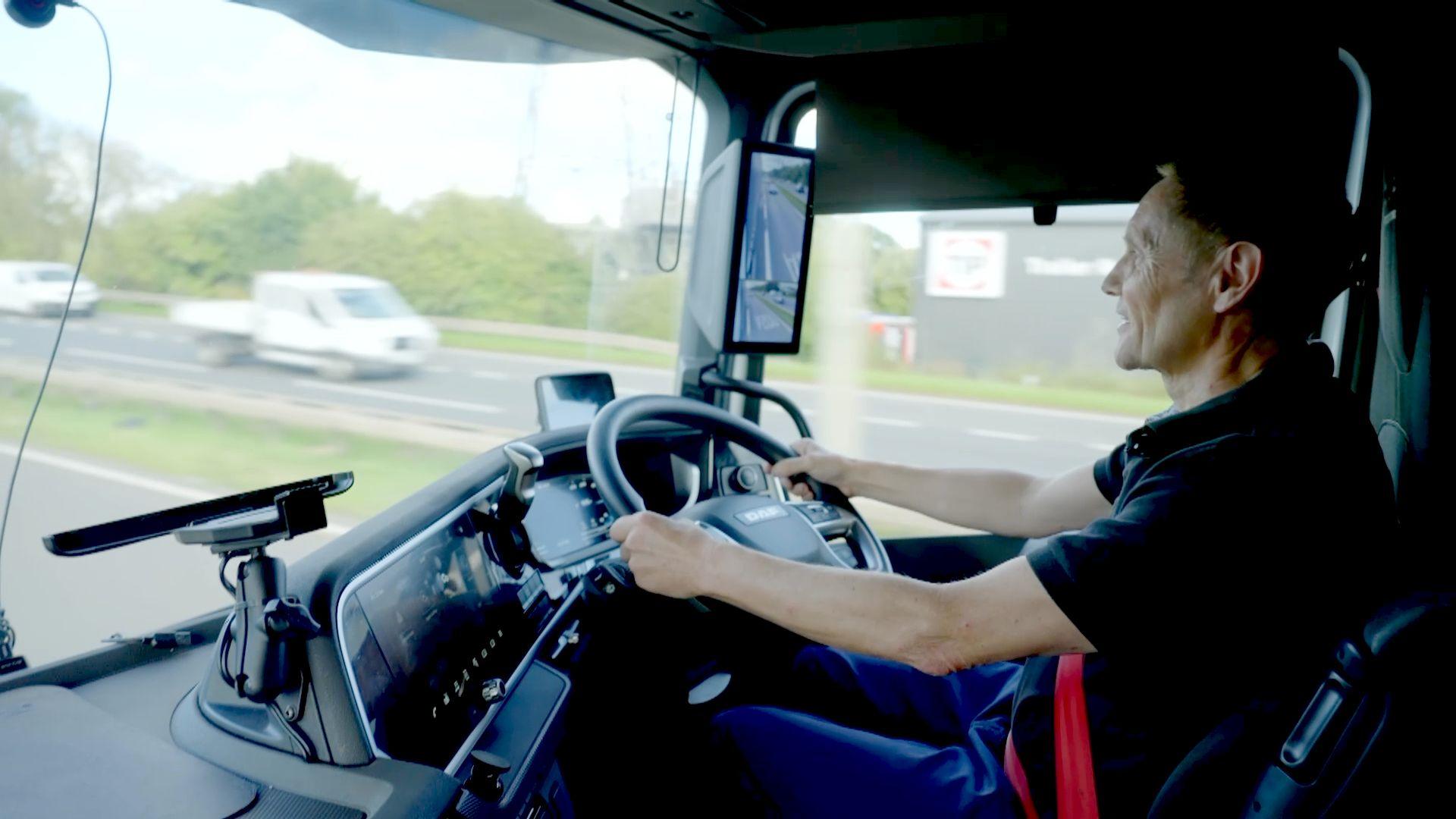
Some drivers told the BBC the sides of their lorries have been slashed overnight
Fraud targeting hauliers - including criminals using bogus haulage companies - is on the rise in the UK, according to the police's National Vehicle Crime Intelligence Service.
"Our industry is under attack," says Richard Smith, managing director of the Road Haulage Association. The industry body hears every day of businesses targeted by "highly organised crime gangs" and police have warned them of "a recent growth" in much more sophisticated methods, he says.
The fraud identified by the BBC appears to follow a pattern previously seen by Europol in mainland Europe, where "legitimate transport companies on the brink of bankruptcy" are bought by organised crime groups who pick up several cargoes "and then vanish".
Lorry Crime Exposed
Watch on iPlayer now, or on BBC One in the East and West Midlands at 20:30 on Monday 17 November
After Alison's firm was targeted, the officers working on her case told her police were also investigating similar crimes in other parts of the UK.
Alison's haulage firm, which moves millions of pounds around the country each year, subcontracted to a smaller transport company for a job earlier this year. She says she sometimes does this when her lorries are busy or in the wrong place.
"Their insurance was in place, their operators' licence was in place," she says. "It looked great." The lorry arrived at the manufacturing company, a forklift truck loaded it up with DIY products and the lorry drove off, she says.
But unknown to Alison and the manufacturers, the lorry had been using fake number plates. It disappeared with the cargo worth £75,000.
"The first we knew about it was the destination company rang us and said, 'where's our load gone?'" Alison says. She tried to ring the subcontractor, but the number had been disconnected.
A dead man's identity
So who had taken the goods? We followed a twisting trail to try to find out, involving a dead man's identity, a mystery Romanian woman and a £150,000 Lamborghini Urus.
The company Alison hired was called Zus Transport. A month before the theft, it had been sold by its previous owners - there is no suggestion they were involved in any wrongdoing.
The BBC discovered that the takeover was funded by a bank transfer from a company owned by a UK-based Romanian lorry driver named Ionut Calin, who went by his middle name Robert.
We found a network of five transport companies, including Zus Transport, seemingly purchased by Mr Calin this year.
But Mr Calin died in November 2024, we confirmed with Romanian officials. That was months before his bank details had been used to buy several of the companies and his name used to register three of them at Companies House.
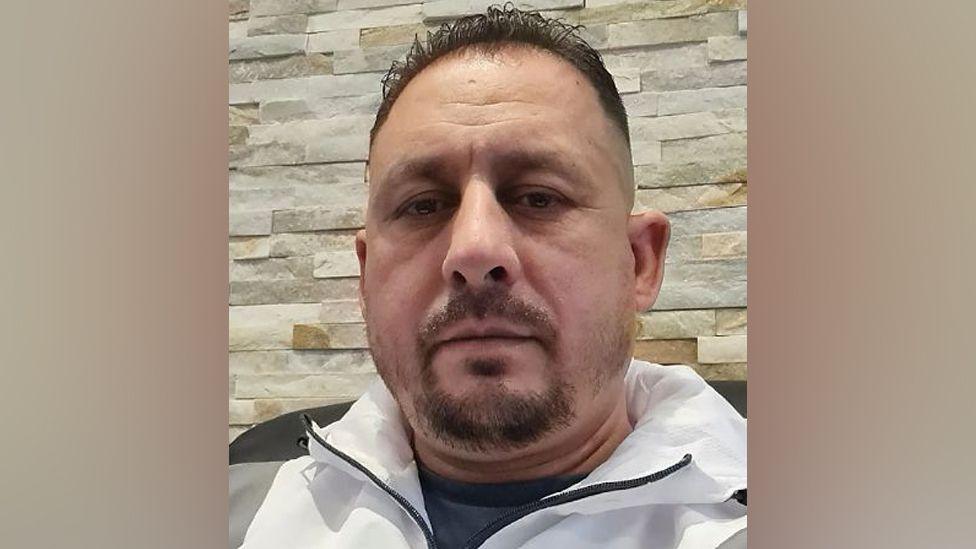
Robert Calin's details were used to buy five transport companies
We have no reason to believe he was involved in crime, and dozens of people on social media paid tribute to him as a good man who helped others in the industry.
The former owners of several of the transport companies said they had dealt not with Mr Calin, but with a man called "Benny". So who was he?
We found him by investigating the director of Zus Transport named in Companies House records, a Romanian woman. Information about her is scarce, but we found a phone number for her. When we searched for the number in WhatsApp, it showed a profile picture of a young woman, with a different name, in a Lamborghini.
The profile picture helped us identify her as a relative of Mr Calin, and the wife of a man named Benjamin Mustata. Mr Mustata and his wife had posed for a photo when collecting a Lamborghini from a dealership in April, a week after the theft targeting Alison's company.

Images of Benjamin Mustata posing with a Lamborghini helped the BBC connect him to the haulage firms
When we showed images from social media of Mr Mustata to a former owner of one of the transport companies, he identified him as "Benny" - the man he had met face-to-face to negotiate the sale of the company.
A phone number Mr Mustata used in 2023 to rent a property in Coventry was also used to arrange collection of the goods stolen by the subcontractors who scammed Alison. The same number had also been used by "Benny" to buy one of the transport companies using Robert Calin's name and bank details.
When we went to Mr Mustata's address to deliver a letter with questions about his suspected involvement in the theft, we were told he had moved to Romania.
That was false. We tracked him down to Coventry, where he was selling luxury cars. Asked about Zus Transport, Mr Mustata said: "Go away." He denied using a dead man's identity to buy haulage companies and using Zus Transport to steal goods.
He admitted buying Zus Transport, but said he did so on behalf of a relative and was not in control of the company at the time of the theft.
Watch: BBC challenges Benjamin Mustata about his links to Zus Transport
Mr Mustata said somebody else had been using Zus Transport's name on a subcontracting platform, and that they must have stolen the goods.
"The company is registered in my address. My own address. I'm living there. How you think, yeah, I was doing things bad to my own address?" he said.
He said the stolen load had "nothing" to do with him, adding: "It's not my fault."
Fraud lawyer Arun Chauhun examined the BBC's findings and said the scheme targeting Alison appeared to be "well set-up", involving identity fraud and deceiving Companies House, the government body that registers limited companies.
He said he thought there was a "kind of malaise that businesses can afford to take the hit" because they have insurance, but in reality crime such as this "damages individual lives, those people who own the businesses".
But as for whoever is ultimately behind the crime, Mr Chauhun said: "I think they're just thinking, well, the system's never going to have the resource to catch up with us."
Labour MP Rachel Taylor, who represents North Warwickshire and Bedworth where about one in five people work in logistics, said the BBC investigation "lays bare what I hear constantly from hauliers: that increasingly sophisticated crime gangs are having a huge impact on their businesses".
She said it had "gone unrecognised for too long", and called for a "joined up national policing strategy and more resources to tackle this issue, so we can put these organised criminals behind bars where they belong".
Deputy Chief Constable Jayne Meir, the NPCC's first lead for freight crime, said a new team at Opal - a police intelligence unit tackling organised acquisitive crime - would start targeting the issue next year.
But in the meantime, business owners such as Alison say crimes like these have a "massive impact".
"We're going home at night and we're not sleeping," she says. "Haulage businesses don't make a lot of money and it only takes something like this and you're out of business."
Related topics
- Published31 July 2024
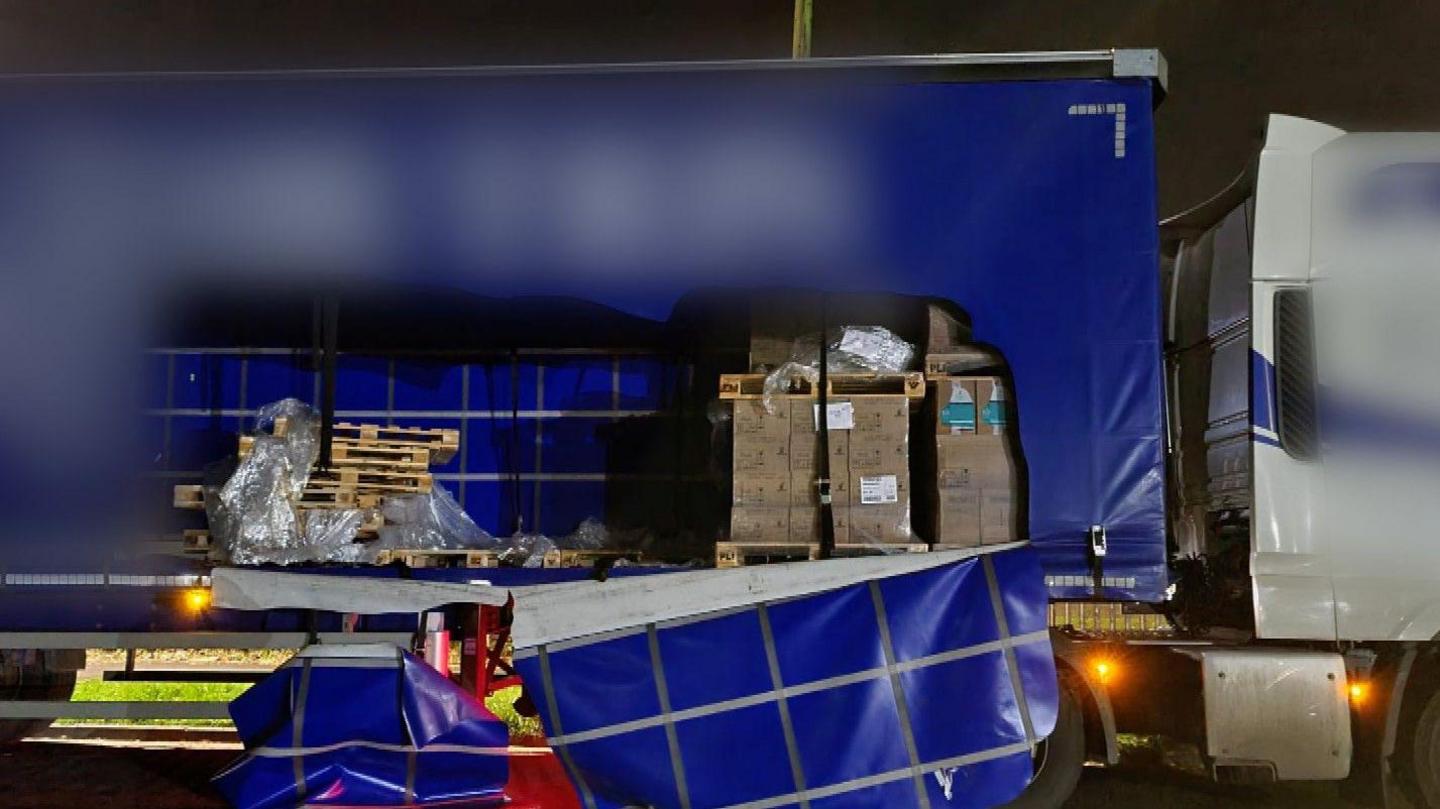
- Published15 February 2024
